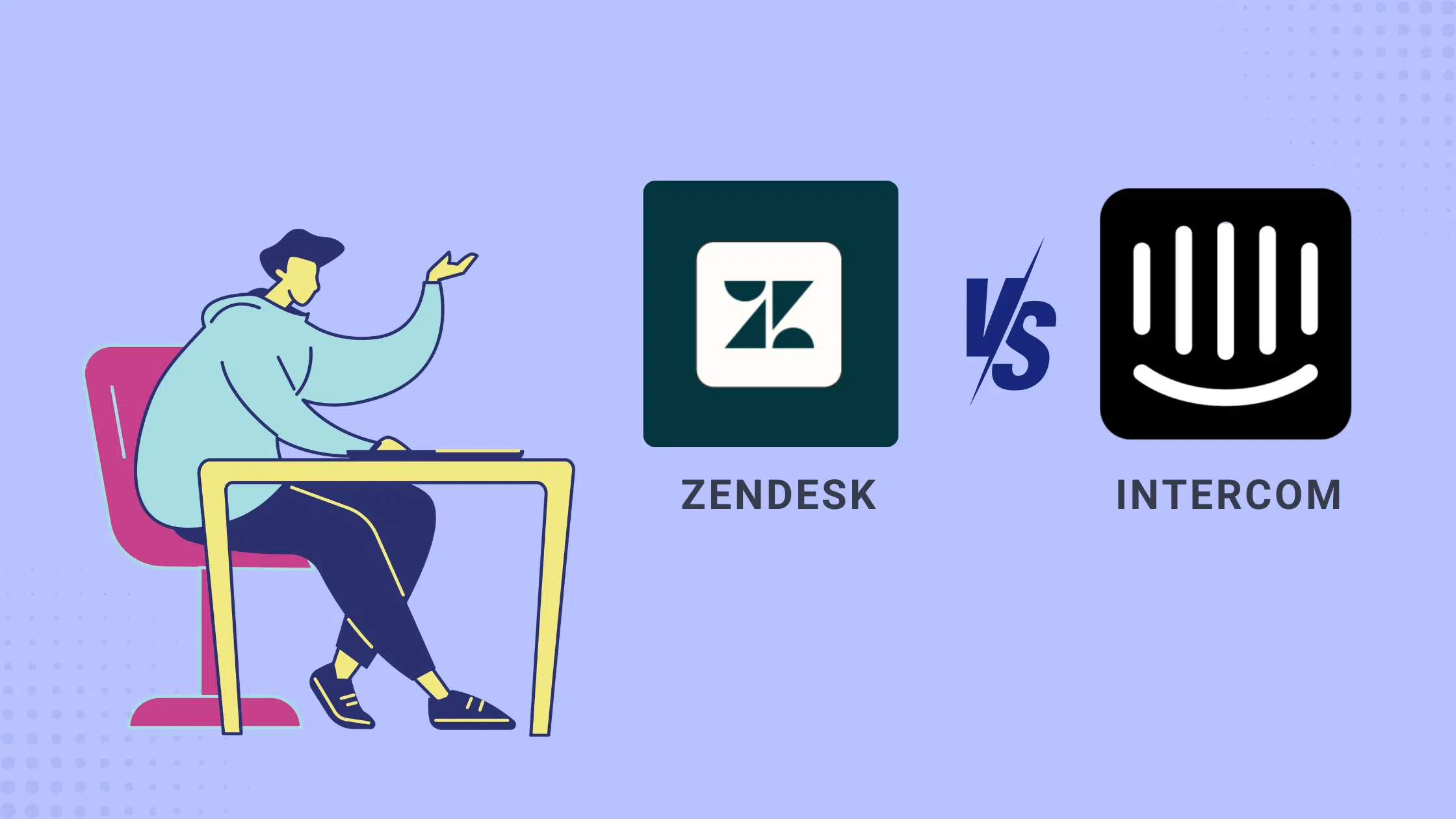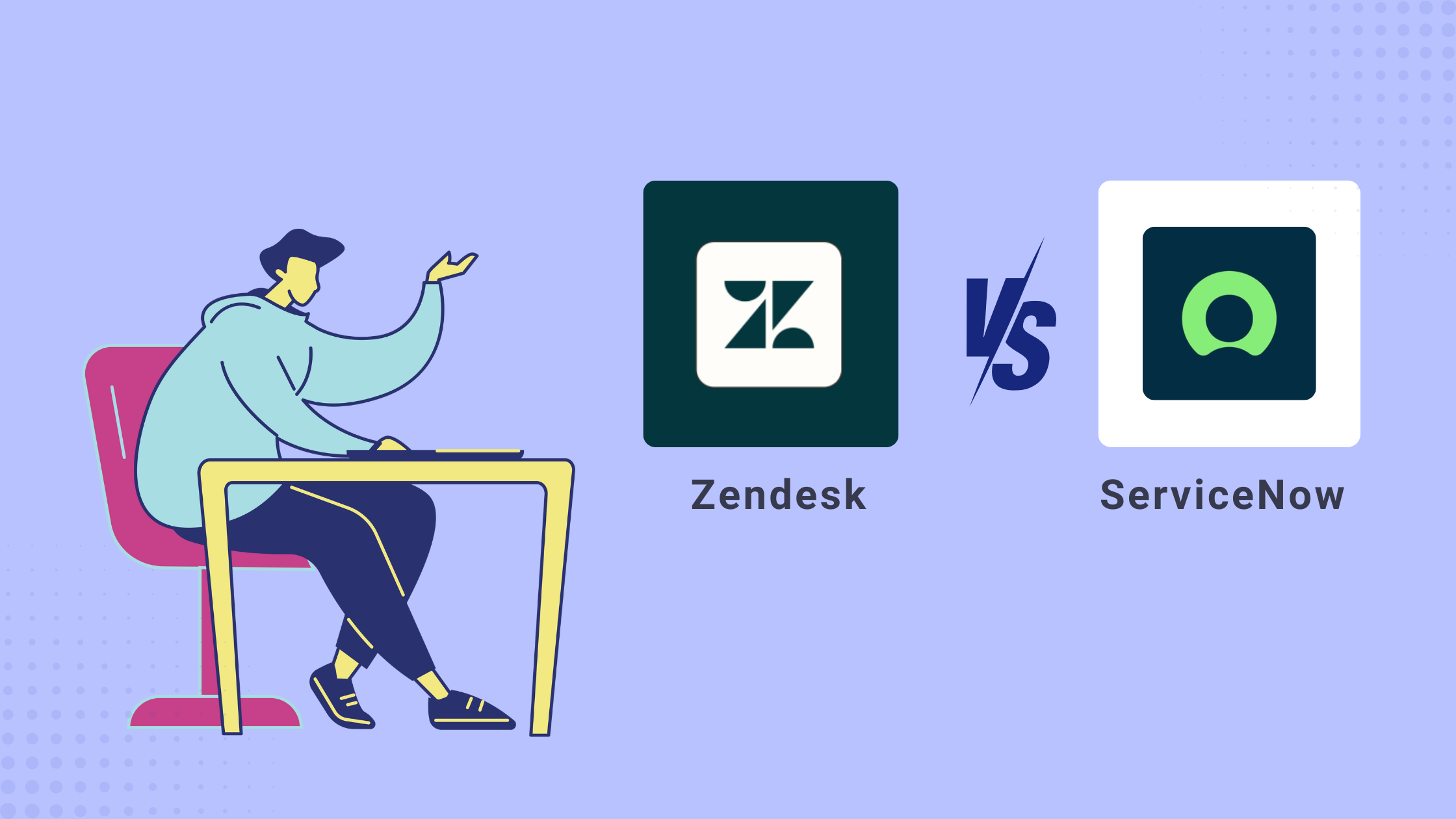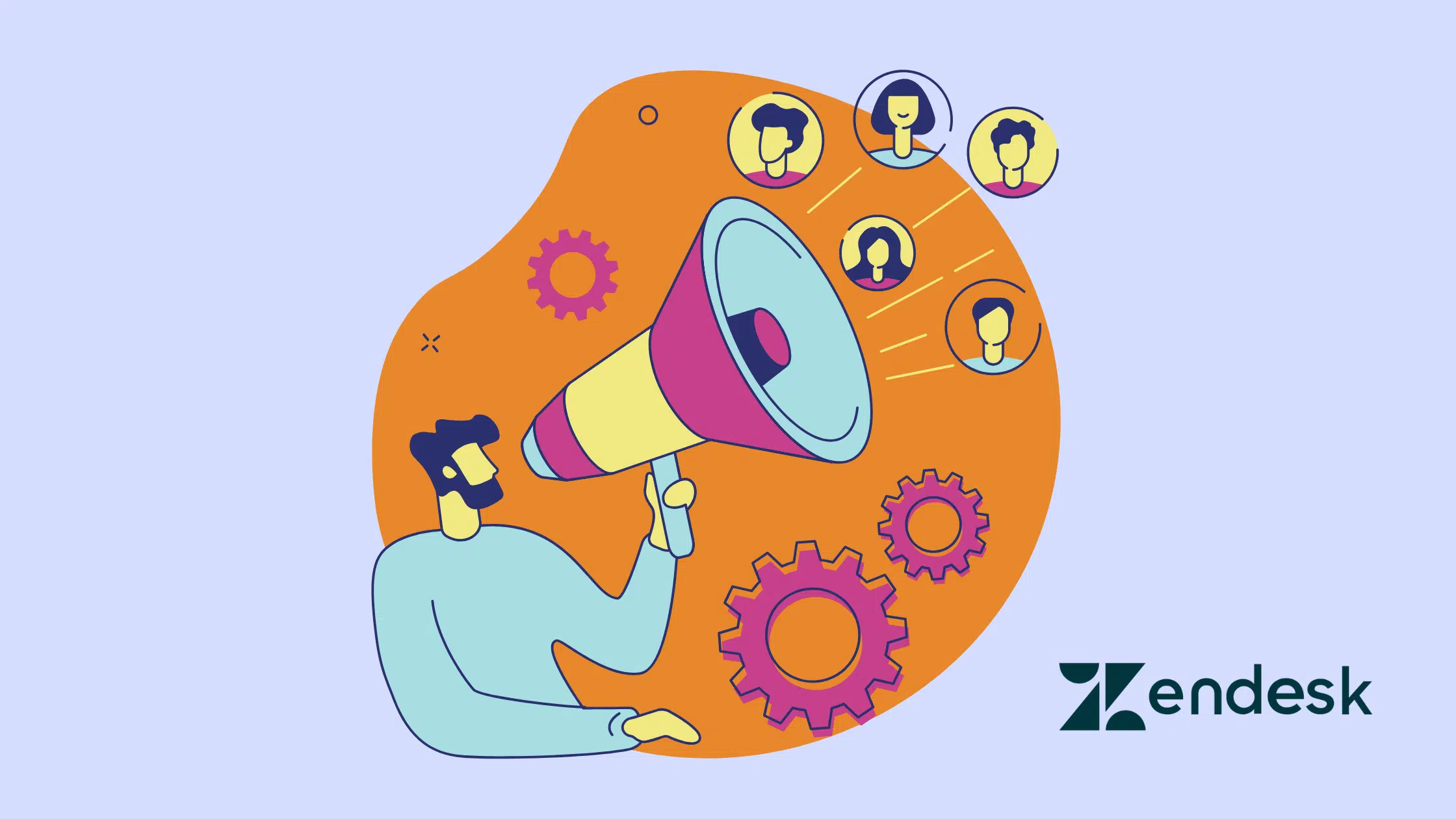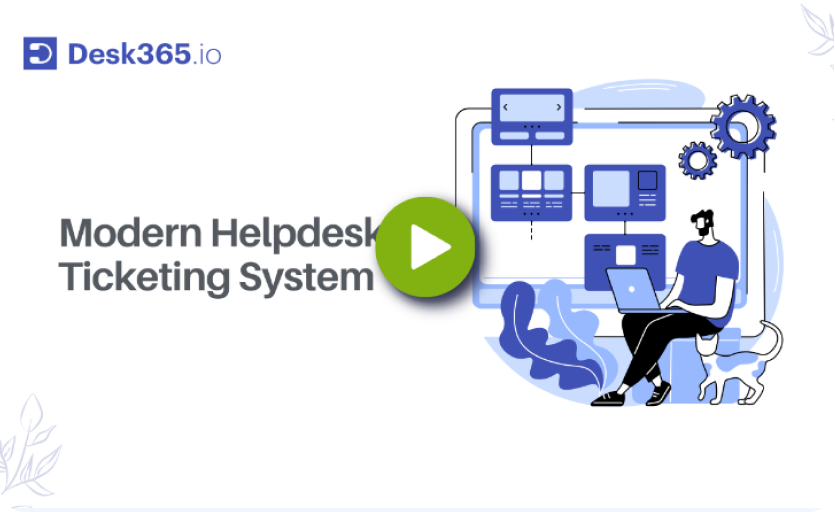Choosing the right customer support platform in 2025 is crucial for any business looking to deliver exceptional customer experiences. With numerous options available, two of the top contenders are Zendesk and Intercom. Both offer unique strengths, but they cater to different types of businesses and customer needs.
Zendesk is ideal for larger companies needing a comprehensive suite of features, while Intercom stands out for its emphasis on real-time customer engagement and automation.
In this comparison, we’ll explore the key differences between Zendesk and Intercom to help you make an informed decision based on your specific business requirements.
Zendesk Overview
Zendesk is a customer service platform designed to help businesses manage customer interactions more efficiently.
It’s like a one-stop-shop for all things customer support, whether that’s answering emails, handling live chats, or managing social media inquiries.
What makes Zendesk so popular is its simplicity and flexibility—companies can easily set it up and customize it to fit their needs, whether they’re a small startup or a large enterprise.
The main feature of Zendesk is its ticketing system. When customers reach out for help, their queries turn into “tickets” that can be assigned, tracked, and resolved.
It offers self-service options, like a knowledge base, where customers can find answers on their own, and community forums where they can interact with each other. The platform also includes automated workflows, which can handle repetitive tasks and help businesses save time.
If your business relies on connecting with customers across different channels—say email, phone, or chat—Zendesk can help you streamline all of that into one place. Plus, it integrates easily with other tools, so it can grow with your business. Whether you’re trying to improve response times or gather insights on customer satisfaction, Zendesk has the tools to help you deliver better support and keep your customers happy.
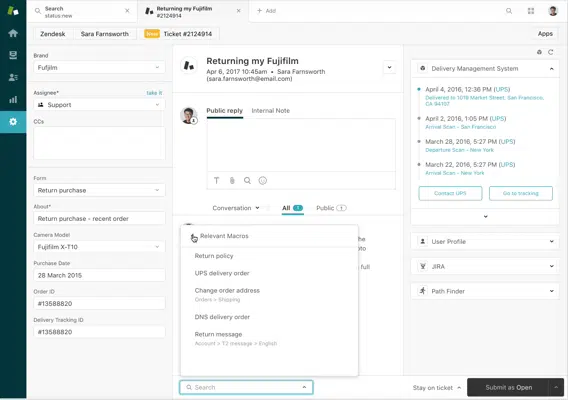
Intercom Overview
Intercom is a customer messaging platform designed to help businesses build stronger relationships with their customers through personalized, real-time communication.
Unlike traditional customer support tools, Intercom focuses on enabling businesses to connect with their customers across a variety of touchpoints, all while providing a seamless experience.
It’s not just about handling support tickets—Intercom is about engaging customers proactively, offering support, and even driving sales through targeted messaging.
Founded in 2011, Intercom has grown into a robust platform known for its user-friendly interface and powerful automation features.
Businesses can use it to manage customer conversations via live chat, email, in-app messages, and even push notifications. It allows businesses to reach out to customers at the right time with the right message, enhancing both the customer experience and the efficiency of support teams.
One of the standout features of Intercom is its live chat system. It enables real-time communication with customers, providing immediate support and assistance. But what really sets Intercom apart is its ability to combine live chat with automated bots.
These bots can handle common inquiries, route conversations to the right team members, or provide customers with instant, self-service solutions through help articles. This mix of live interaction and automation helps companies scale their support while still delivering a personalized experience.
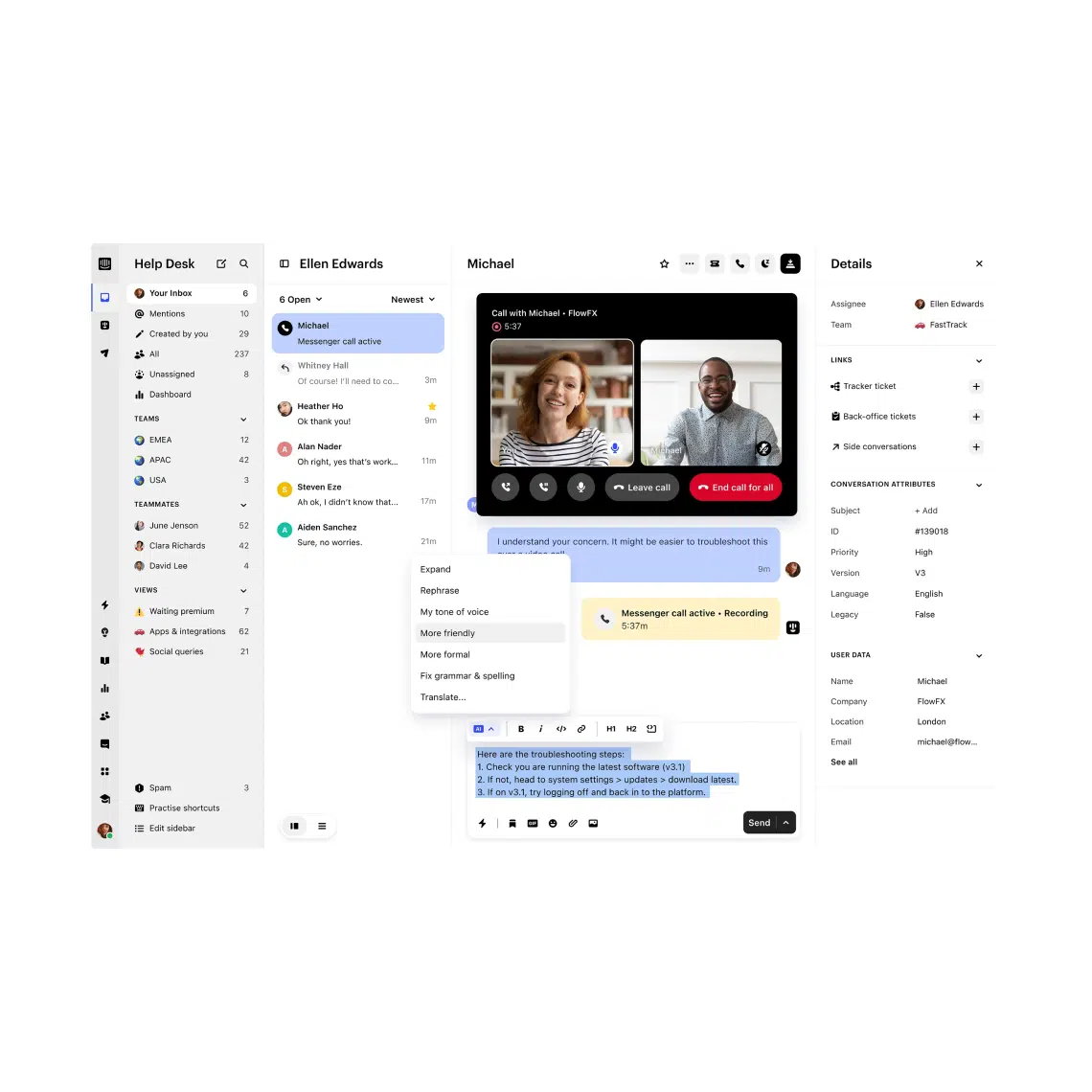
Overview of feature comparison of Zendesk and Intercom
Zendesk and Intercom are both powerful customer support platforms, each offering unique features to enhance customer engagement.
Zendesk is known for its comprehensive and scalable solutions, making it ideal for larger enterprises. It offers an intuitive interface, extensive customization options, advanced reporting, and over 1,700 integrations, allowing businesses to streamline their customer support operations.
Additionally, its AI-driven Answer Bot automates responses, improving efficiency and reducing response times.
In contrast, Intercom focuses on real-time, personalized customer interactions with a strong emphasis on proactive support.
Starting at $29 per agent per month, Intercom offers AI-powered features like the Fin AI Agent to handle customer queries and live chat functionality.
It excels in offering multi-channel support through email, in-app messaging, and push notifications, and it allows businesses to engage customers based on specific behaviors. While Intercom’s integrations are fewer than Zendesk’s, its ability to target specific customer segments with personalized messaging is a standout feature.
Here is the Zendesk vs Intercom feature comparison.
Features

$12
/agent/month billed annually

$132
/agent/month billed annually
$89
/agent/month billed annually
AI Agents
( $0.99 per resolution)
(Only on Suite Plans)
Microsoft Teams App for Agents
(Complicated Process)
Create Tickets from Microsoft Teams
Email Ticketing
Customer Support Portal
(Only on Suite Plans)
Knowledge Base
(Only on Suite Plans)
Automations
SLAs
Inc. Reminders & Escalations
(Only on Enterprise plans)
Custom Ticket Forms
(Only on Enterprise plans)
Custom Roles
(Only on Enterprise plans)
Zendesk vs Intercom: Which is right for your business?
When deciding between Zendesk and Intercom, understanding their distinct features can help you make the right choice for your business’s customer support needs.
Pricing
The user highlights that while Zendesk offers great features that make sense for growing small businesses, the pricing can increase as more features are added. This can result in small businesses facing high bills, which might price them out of using the service as they grow.
Pricing can get pretty steep as you add on features. Most of our clients are small businesses in a stage of growth—so while the features make perfect sense for their teams, sometimes the bill ends up pricing our people out.
This review emphasizes that Intercom is becoming increasingly expensive with each new feature added. The user mentions that Intercom has become the most expensive service in their company, and the rising cost makes it difficult to use other tools alongside it.
Intercom is really too expensive and each new feature are more and more expansive. We can't use other feature, Intercom is the service with the higer price in our company.
Desk365: An affordable and user-friendly alternative
Desk365 is quickly gaining attention as a standout choice for businesses looking for a more affordable and user-friendly alternative to Intercom. What makes Desk365 appealing to so many users is its straightforward design and ease of use, which allows teams to get up and running without a steep learning curve.
One of the biggest advantages users highlight is the cost-effectiveness, making it a solid option for small to mid-sized businesses that need quality support tools without breaking the bank.
Additionally, the Desk365 development team is praised for being highly responsive to user feedback, continuously improving the platform based on real suggestions. This responsiveness not only improves the user experience but also shows the company’s commitment to meeting customer needs.
It's so easy to use and configure due to the simple interface. In addition, it's also cheaper compared to other ticketing systems in the market. Not to mention the amazing functions provided and the fast responses from Desk365 support team."
Best-in-class customer support without breaking your bank
Number of agents:
Desk365
Intercom
Zendesk
Intercom vs Zendesk: Features
When comparing Intercom vs Zendesk in terms of features, both platforms provide robust support tools but have unique differences that cater to different types of businesses.
Intercom focuses on a messaging-first approach with an emphasis on real-time support. It provides a live chat feature that allows businesses to engage with customers instantly. Intercom’s standout feature is its AI-powered Operator Bot, which automates customer interactions and can help route conversations or answer simple queries. Additionally, it offers messaging across multiple channels, including email, in-app chat, and social media.
However, Intercom’s advanced features, such as its reporting and analytics tools, are often limited to higher-tier plans, which could make it less accessible for small businesses or startups looking for cost-effective options.
Zendesk, on the other hand, provides a comprehensive suite of tools for managing customer support through a traditional ticketing system. It allows businesses to create, track, and respond to customer inquiries through multiple channels such as email, phone, chat, and social media. Zendesk also offers a robust set of automation and reporting tools, including advanced ticket routing, workflow triggers, and in-depth reporting and analytics.
Another strong point for Zendesk is its customizable support platform, which is ideal for larger organizations with complex needs. It also offers a more extensive knowledge base feature, allowing businesses to organize and manage self-service content more effectively.
Zendesk’s AI-powered Answer Bot helps customers resolve basic queries autonomously, but it tends to fall short compared to Intercom’s more advanced AI capabilities.
The user describes several issues with Zendesk’s features. They mention that it is difficult to cancel a contract, and it’s hard to get in touch with a human in the support team.
It's difficult to cancel your contract. It's difficult to get through to a human in their Support team. A lot of the reporting features are only available for 'Elite users'. Doesn't automatically reconcile duplicates. The Reach feature is not GDPR compliant and therefore has no use in Europe. Many of the reporting features are available only for 'Elite users' only. It would be nice to have more automated features and prompts.
The Intercom user highlights that the AI agent is not always accurate and suggests that improvements could be made. This feedback indicates that while Intercom offers an AI-driven support system, the technology still has room for improvement, especially in providing accurate responses.
The AI agent isn’t always accurate and could do with some work to improve it
Here’s what a Desk365 customer thinks about Zendesk
Desk365 can be customized to your absolute liking. You can pull granular reporting, view and sort your tickets with ease and stay organized. There is so much automation, it's very user friendly and easy to set up. We are so glad to have made the switch from Zendesk and we would not go back! Desk365 is also Soc 2 Type 2 compliant! This is a premium helpdesk at a great price. I couldn't manage IT without it! I am also continuously impressed with their client dedication - if you suggest an improvement, they genuinely take it into consideration! They consistenltly roll out improvements. We are so grateful!
Intercom vs Zendesk: Automation
When comparing Intercom vs Zendesk in terms of automation, both platforms offer powerful tools to streamline customer service workflows, but they differ in their approach and capabilities.
Intercom shines with its automation features, particularly through its Operator Bot, which can engage customers instantly, automate responses, and route conversations based on pre-defined conditions. Intercom’s automated workflows allow businesses to efficiently handle inquiries, escalate issues, and even integrate automated marketing tools for customer engagement. Additionally, Intercom offers proactive messaging that can reach out to customers based on specific triggers.
Zendesk also offers strong automation features, but its approach is more structured around ticket management. With Zendesk, businesses can automate ticket routing, ticket prioritization, and escalation through triggers and macros. It also supports automated notifications for both customers and agents. However, Zendesk’s automation tools are more focused on support workflows than proactive messaging, making it better suited for teams that require more control over support ticket management.
Intercom vs Zendesk: Integration
In terms of integration, both platforms provide a variety of options to connect with third-party tools and services, but Zendesk generally offers a wider range of integrations due to its longer presence in the market.
Intercom supports integrations with a variety of tools, especially in the areas of CRM, marketing automation, and customer engagement. Its integrations with platforms like Salesforce, Slack, and HubSpot make it an ideal choice for businesses that want to blend support with sales and marketing functions. However, it is more focused on tools that cater to smaller, tech-driven businesses.
Zendesk offers a broader spectrum of integrations, supporting not only CRM and marketing tools but also many enterprise-level solutions like Salesforce, Microsoft Dynamics, and Jira. Its extensive app marketplace makes it easy to extend its functionality, especially for larger organizations with complex system requirements.
Intercom vs Zendesk: AI
When it comes to AI, both platforms leverage artificial intelligence to enhance customer support, but they differ in their capabilities and use cases.
Intercom has a more advanced AI-driven support system with its Operator Bot. The bot can automatically answer customer inquiries, suggest articles, and route conversations to the right team members. Intercom’s AI is designed for proactive support, meaning it can reach out to customers based on behaviors and data, offering more dynamic and personalized interactions. However, some users have noted that its AI still requires refinement, particularly in handling complex queries.
Zendesk offers AI features through its Answer Bot, which helps resolve customer issues by suggesting relevant articles from the knowledge base. While it’s less dynamic compared to Intercom’s AI, Zendesk’s Answer Bot is highly effective at handling routine queries and directing customers to self-service options. Additionally, Zendesk’s AI integration is tightly connected with its ticket management system, making it a useful tool for automating support workflows.
The user is highlighting the challenges and limitations of using Intercom’s AI for customer support, particularly regarding its lack of learning from past interactions and its reliance on static knowledge bases and question-answer pairs. However, they suggest that with the right setup, it can still be effective, especially for businesses with high ticket volumes.
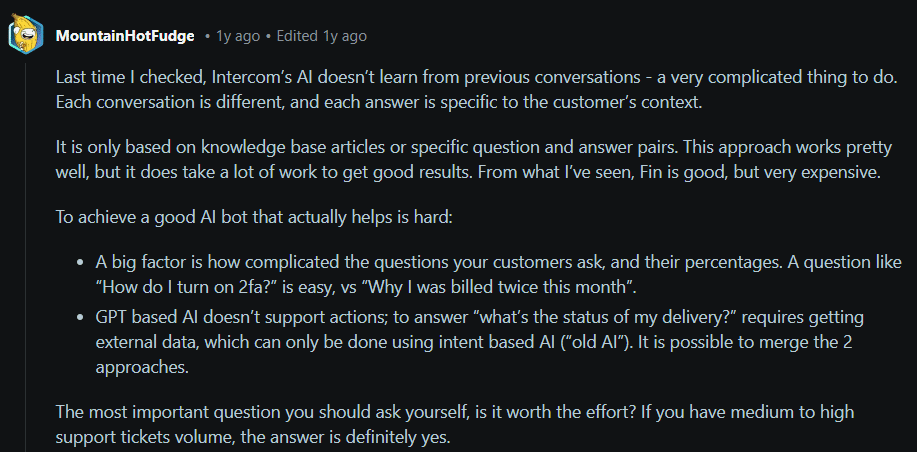
Intercom vs Zendesk: Knowledge Base
Both Intercom and Zendesk offer robust knowledge base features, but their approach and functionality vary based on the type of support system your business needs.
Intercom provides a basic help center that includes articles, FAQs, and tutorials. The knowledge base is designed to be simple and easy to use, with features like multilingual support and search engine indexing. However, its search functionality and article management are more limited compared to Zendesk, which might be a drawback for businesses with larger support teams or more extensive content.
Zendesk excels with its comprehensive knowledge base offering. It includes advanced article management, custom content categorization, and a highly intuitive search engine. Its generative search AI provides users with instant answers based on their queries, improving self-service support. Additionally, Zendesk supports multiple languages, which is especially useful for global companies that need to deliver support content in different languages.
Intercom vs Zendesk: Customer support
Customer support is a critical factor when choosing between Intercom and Zendesk. Both platforms offer varying levels of support for their users.
Intercom provides a highly responsive support system, with access to chat, email, and phone support. It also offers a self-service support portal, but some users report that reaching a human agent can sometimes be difficult. The focus is heavily on real-time, automated support through AI bots and messaging.
Zendesk, being a more traditional customer service platform, provides comprehensive customer support through its Help Center, offering email, chat, phone, and even social media support. Many users appreciate Zendesk’s easy access to live agents and the well-organized ticket management system. However, it has been noted that Zendesk can sometimes be slow to respond during peak periods, especially for lower-tier plans.
Good luck getting live support. If you do get support, they will just forward you articles.
See what Zendesk users are saying about their customer support experience.
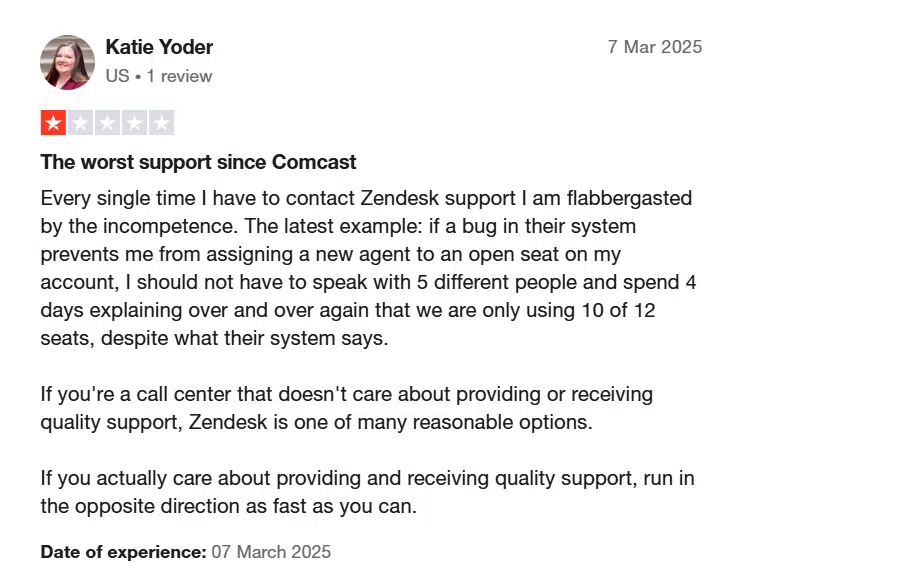
Source: Trustpilot
Zendesk vs Intercom: Which platform should you pick in 2025?
In 2025, deciding between Zendesk and Intercom really depends on what your business needs. Zendesk is perfect for larger companies with complex customer service needs. It offers a ton of advanced features, powerful integrations, and great multichannel support. If you’re looking for deep analytics, detailed reporting, and a platform that can handle a lot of customization, Zendesk delivers, though it does come with a higher price tag.
Intercom, on the other hand, is great for businesses that want a more conversational approach to customer support. It’s especially strong in live chat, messaging, and automation, making it a great choice for businesses that prioritize engagement. While it doesn’t have the same depth of features as Zendesk, its simplicity and focus on customer interaction make it a great option for smaller to mid-sized companies or those just starting to scale.
If you’re trying to find a sweet spot between powerful features, ease of use, and affordability, Desk365 is definitely worth checking out.
Desk365 stands out because it combines the best of all worlds:
An easy-to-use interface that takes minutes to set up.
Automation for repetitive tasks, saving you time.
Visual reports and analytics to keep you on top of things.
Integrations with key tools like Microsoft Teams.
Reliable, 24/7 customer support that’s always there when you need it.
If you want a platform that balances functionality and affordability, Desk365 offers a lot of value, no matter the size of your business.
Ready to see for yourself? Sign up for a free trial with Desk365 and see how it can take your customer support to the next level.

